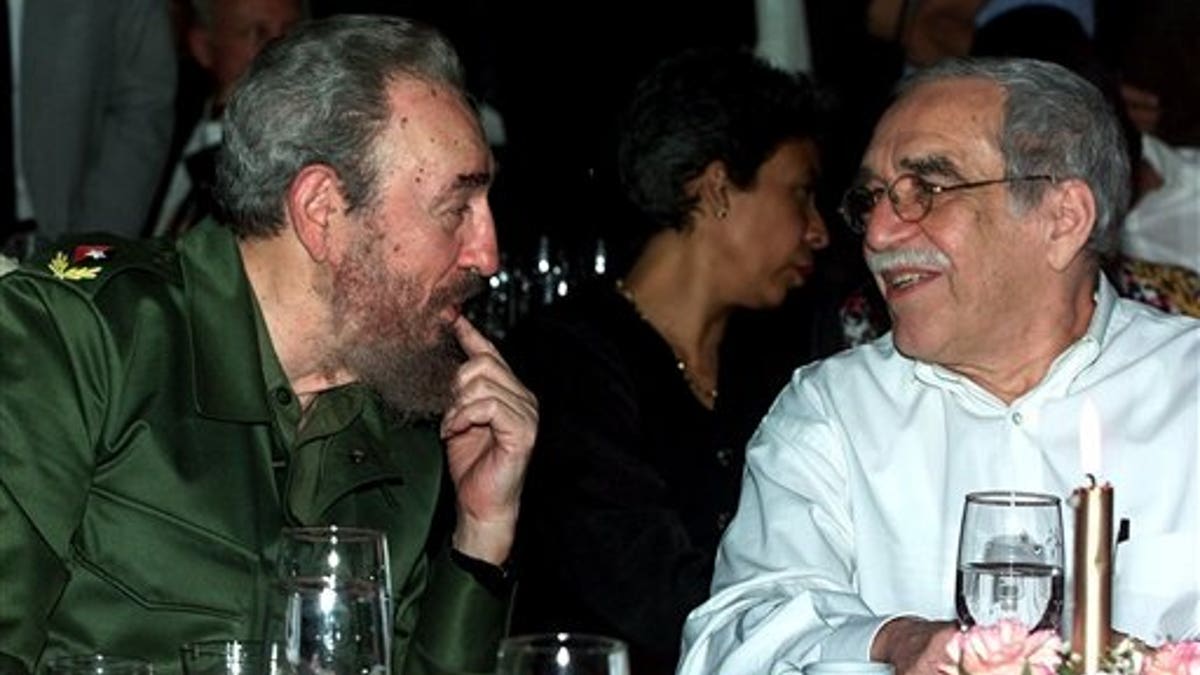
Gabriel Garcia Marquez and Fidel Castro. (AP)
Many lavished praise upon Colombian writer Gabriel García Márquez, who died Thursday at the age of 87, recalling his mark on the literary world and how he bolstered Latin American works.
But others reacted with bitterness and condemnation over the Nobel laureate who was vocal and adamant about his disdain for the U.S. government and his fondness for Cuban leader Fidel Castro, with whom he enjoyed a close friendship.
Detractors posted quotes by García Márquez, a self-styled socialist, expressing admiration for Castro, and affection for the Communist leader he depicted as a gentle soul.
You remember what Camus wrote, that a very intelligent man in some areas can be stupid in others. In politics, intellectuals have been very stupid in many, many cases.
“Here's hoping that Fidel Castro and #GabrielGarciaMarquez are soon reunited,” tweeted Tony Hernandez, co-founder of the Immigrant Archive Project and president of the Latino Broadcasting Company. “While the world mourns a literary great, I recall a Communist who defended the indefensible abuses of Fidel Castro. #GabrielGarciaMarquez”
Univision anchor Jorge Ramos tweeted: “The most difficult thing to understand about García Márquez was his friendship and support of Cuban dictator Fidel Castro.”
Israel Abreu, a New Jersey accountant who was a political prisoner in Cuba, wrote “Gabriel García Márquez is dead, but I am not sad.”
“Many today say ‘All Latin America is sad,’ but I cannot possibly be because García Márquez tried to help with his fame the tyranny of Fidel Castro to be seen around the world as a humanitarian government," Abreu wrote in Spanish, “thus obscuring the thousands of executed, the hundreds of thousands of dissidents jailed, and the millions of displaced people. I cannot accept that various accomplishments should negate the tight bond that Gabo had with such an ironclad tyranny.”
García Márquez countered he had worked behind the scenes to secure the release of jailed Cuban dissidents, and had served as an intermediary between Castro and President Bill Clinton, with whom he also enjoyed a friendship.
The United States, though, did not look kindly upon his friendship with Castro and his rants against “U.S. imperialism,” and denied the Colombian writer a visa to travel to here for more than three decades.
García Márquez met Fidel Castro shortly after the bearded revolutionary took power in 1959.
The relationship grew so close that the writer even had a house in Cuba, and would send Castro drafts of his work.
In 2003, Castro wrote about García Márquez: “I have always received from Gabo pages that he is still working on, with that generous and simple gesture with which he always sent me - and other people whom he appreciates very much - the preliminary drafts of his books, as proof of our old and affectionate friendship.”
Castro went on to describe the writer as “a man of cosmic talent with the generosity of a child, a man for tomorrow, and we thank him for having lived that life in order to tell it.”
His friendship with Castro even was derided by fellow writer, Peruvian Mario Vargas Llosa, who had a falling out with García Márquez over various issues and termed him “a courtesan of Fidel Castro” who turned a blind eye to abuses the Cuban leader committed against dissidents.
In an interview with The Daily Beast last year, Vargas Llosa addressed the comment about García Márquez by saying: “You remember what Camus wrote, that a very intelligent man in some areas can be stupid in others.”
“In politics, intellectuals have been very stupid in many, many cases. They don’t like mediocrity. And democracy is an indication of mediocrity; democracy is to accept that perfection doesn’t exist in political reality.”
Mike Gonzalez, vice president of communications at the Heritage Foundation, agreed.
“I didn’t like that he was cozy with a dictator who ruined the country where I was born,” said Gonzalez, who tweeted about the controversial friendship after the writer’s death. “I am a conservative, but that doesn’t mean I give a pass to dictators from the right, or to repressive governments from the right. I never understood why intellectuals on the left give a pass to dictators form the left.”
Chilean poet Pablo Neruda, Gonzalez said, praised Soviet dictator Joseph Stalin.
“There wasn’t a dictator he didn’t like,” he said of Neruda. “He praised Lenin and Stalin, even at the height of massacres.”




















